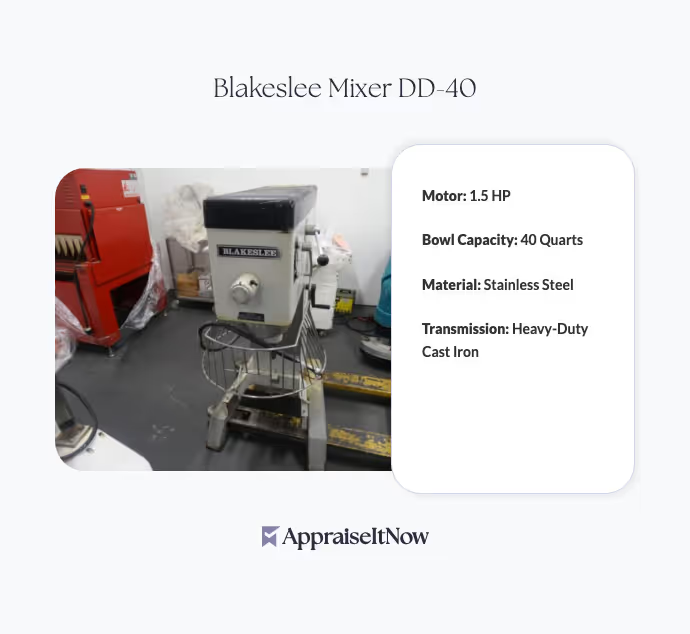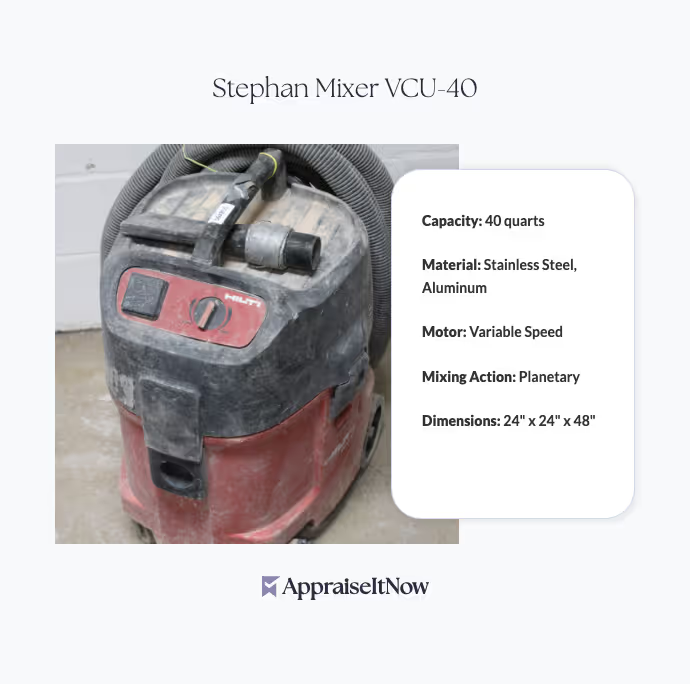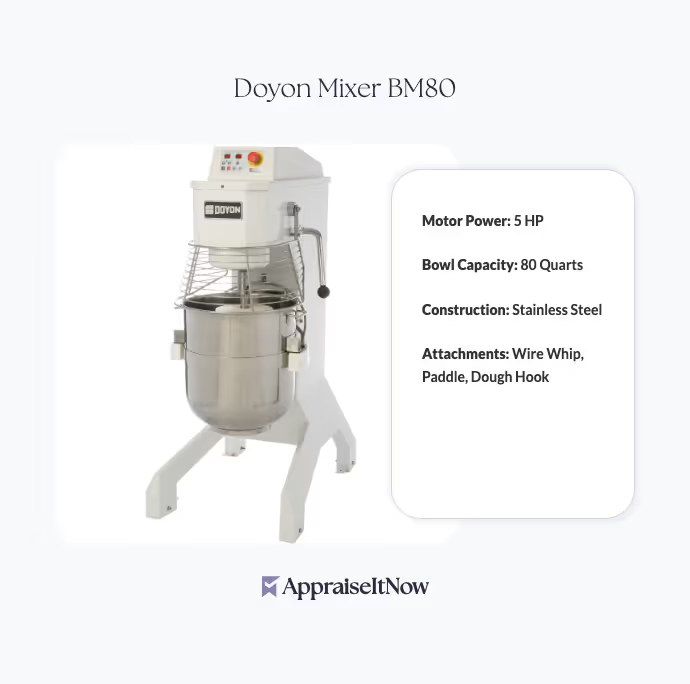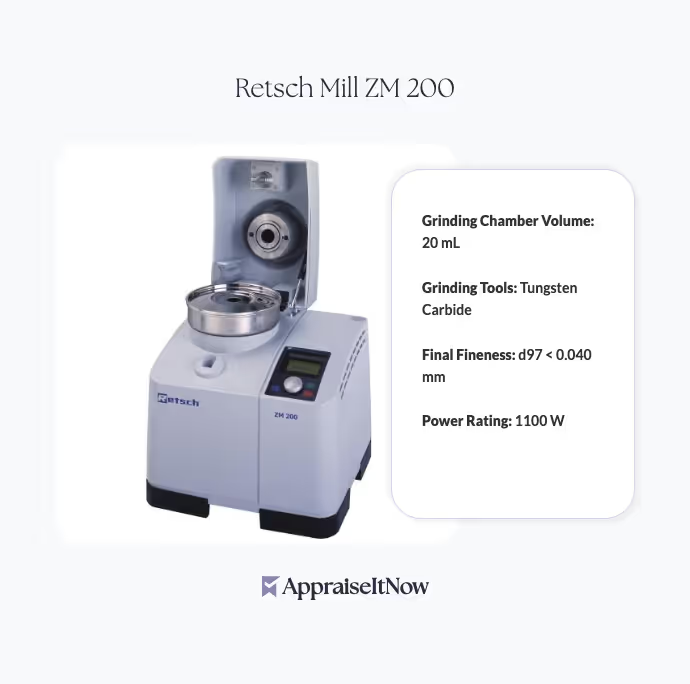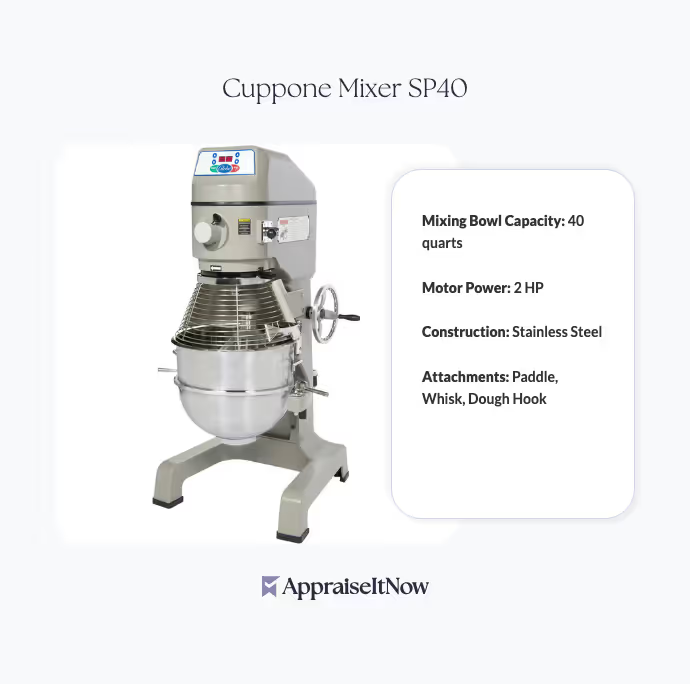<h1>How to Get Your Blakeslee Mixer DD-40 Appraised</h1>
<p>The <strong>Blakeslee Mixer DD-40</strong> is a commercial workhorse found in bakeries, catering companies, and food production facilities across North America. If you're buying, selling, or insuring this industrial mixer, understanding how to get an accurate appraisal ensures you capture its true value—typically ranging between <strong>$15,000 and $25,000</strong> depending on condition, age, and operational hours.</p>
<h2>Understanding Your Blakeslee Mixer DD-40's Market Value</h2>
<p>The Blakeslee DD-40 commands respect in the commercial kitchen equipment market due to its exceptional durability and proven track record spanning decades. With only <strong>500 units produced worldwide</strong> since its introduction in 1960, this mixer represents a rare piece of <strong>food processing equipment</strong> that continues delivering reliable performance in demanding environments. The combination of scarcity, industrial heritage, and proven functionality creates consistent demand among restaurant operators and food production facilities seeking dependable mixing solutions.</p>
<p>When evaluating your DD-40, recognize that its market value reflects more than just its mechanical capability. The mixer's <strong>18/8 stainless steel construction</strong>, <strong>NSF certification</strong>, and <strong>ETL listing</strong> indicate commercial-grade quality that inspectors and health departments recognize. These certifications alone differentiate the DD-40 from lesser equipment, supporting valuations in the mid-to-upper range of the market spectrum.</p>
<div class="callout tip"><p><strong>Value Factor</strong></p>
<p>Blakeslee mixers manufactured before 1980 with verified service records can command premiums of 10-15% over standard market pricing due to their documented longevity.</p></div>
<h2>Key Specifications That Impact Appraisal Value</h2>
<p>Your DD-40's technical specifications directly influence professional appraisals. The mixer's <strong>1.5 HP motor</strong> powers a <strong>40-quart stainless steel bowl</strong>, enabling it to handle high-volume operations that would overwhelm smaller equipment. This capacity makes it particularly valuable in institutional or commercial settings where consistent batch sizes matter.</p>
<p>The variable-speed control represents another critical value driver. Unlike fixed-speed competitors, your mixer's precision capability allows operators to match motor speed to mixing tasks—gentle folding for delicate ingredients, aggressive mixing for dough development. This versatility translates to broader operational applications, which professional appraisers recognize when evaluating <a href="/types/restaurant-equipment">commercial restaurant equipment</a>.</p>
<p>The included <strong>paddle, whisk, and dough hook attachments</strong> expand the mixer's functionality significantly. A complete set of original, undamaged accessories can add $1,000-$2,000 to your appraisal value, while missing components typically reduce valuation proportionally. When seeking an appraisal, ensure all original documentation and accessories accompany the equipment for evaluation.</p>
<h2>Essential Documentation for Your Appraisal</h2>
<p>Professional appraisers require specific documentation to validate your Blakeslee DD-40's value accurately. Start by locating your <strong>serial number</strong>—this identifier appears on the equipment's frame and enables verification of manufacturing date and authenticity. For a mixer introduced in 1960 with 500 units produced worldwide, serial number validation proves particularly important for establishing provenance.</p>
<p>Maintenance records dramatically strengthen your appraisal. If you possess documentation of <strong>regular service, repairs, or component replacements</strong>, provide these records to your appraiser. Facilities that maintain detailed maintenance logs often receive valuations 15-20% higher than comparable equipment without documentation, as consistent upkeep directly correlates with remaining useful life.</p>
<p>Original <strong>OEM specifications and manuals</strong> further support professional valuation. These documents confirm the mixer's original capabilities and help appraisers assess whether current condition matches factory standards. High-resolution <strong>photographs from multiple angles</strong>—including the serial plate, motor nameplate, and any visible wear—enable remote assessment by certified appraisers if in-person inspection isn't feasible.</p>
<div class="callout note"><p><strong>Documentation Tip</strong></p>
<p>Photos should capture the equipment's overall condition, detail of wear patterns, state of the stainless steel bowl, and close-ups of all nameplate markings for comprehensive remote evaluation.</p></div>
<h2>Condition Assessment and Its Effect on Value</h2>
<p>Professional appraisers grade equipment condition using standardized criteria adapted from <a href="/types/heavy-machinery">heavy machinery</a> and <a href="/blog/appraising-industrial-equipment-assessing-machinery-and-manufacturing-assets">industrial equipment</a> valuation practices. Your DD-40's market value directly correlates with condition grading across several dimensions.</p>
<p><strong>Operational functionality</strong> forms the foundation of condition assessment. A mixer that starts reliably, maintains consistent speed, and produces uniform mixing results typically commands 70-80% of peak market value. If your equipment exhibits inconsistent speed control, motor hesitation, or transmission noise, appraisers typically reduce valuations by 15-30% depending on repair cost estimates and remaining operational viability.</p>
<p><strong>Cosmetic and structural condition</strong> of the stainless steel bowl and cast-iron base affects perceived value. Surface discoloration, minor dents, or light rust spots rarely reduce value significantly, as these are expected in commercial equipment with heavy use. However, significant structural damage, large corrosion areas, or evidence of improper storage may reduce appraisals by 20-40%. The <strong>5-year warranty</strong> backing your mixer (if still valid) can add $500-$1,000 to valuations, as it provides ongoing protection for the new owner.</p>
<h2>Why Hours of Operation Matter in Valuation</h2>
<p>Unlike automobiles where mileage drives valuation significantly, commercial equipment appraisers approach operating hours with nuanced perspective. A <strong>Blakeslee Mixer DD-40 with 10,000 documented operating hours</strong> at a high-volume bakery often carries similar value to a model with 25,000 hours at a low-volume catering operation. What matters most is the ratio of use intensity to maintenance quality.</p>
<p>Appraisers recognize that consistent, moderate usage with proper maintenance typically produces longer remaining service life than sporadic, intense use without documented care. If you can provide documentation showing that your mixer operated in a professional bakery with regular maintenance schedules, this context supports valuations in the $20,000-$25,000 range. Conversely, equipment with unclear operating history or suspected intense, unmonitored use typically receives conservative valuations toward the $15,000 level.</p>
<h2>Replacement Parts Availability and Its Valuation Impact</h2>
<p>The availability of replacement components directly influences your DD-40's appraised value and future usability. Unlike modern equipment where some manufacturers discontinue parts within 5-10 years, Blakeslee maintains parts support for the DD-40 due to its commercial kitchen presence worldwide. Professional appraisers factor this parts availability into valuations, knowing that buyers can confidently invest in equipment knowing repairs remain feasible.</p>
<p><strong>Motor replacements</strong>, <strong>seal kits</strong>, <strong>attachment mechanisms</strong>, and <strong>bowl handles</strong> remain available through commercial food service suppliers. This parts ecosystem supports higher valuations than comparable equipment lacking established supply chains. When appraisers evaluate your mixer, they verify current parts availability and pricing, often contacting suppliers to confirm replacement cost estimates. Equipment with known, affordable parts generally commands 10-15% premiums compared to equipment where repairs require expensive sourcing or fabrication.</p>
<h2>Model Variations and Their Market Implications</h2>
<p>The Blakeslee DD-40 line includes several variations that impact appraisal values. While the standard <strong>40-quart capacity</strong> remains most common, appraisers distinguish between models manufactured in different eras. Earlier models (pre-1980) often featured simpler control systems but more robust cast construction, appealing to traditionalist operators. Later variants introduced improved controls and refined aerodynamics without sacrificing durability.</p>
<p>The mixer's <strong>commercial specifications</strong>—NSF certification, ETL listing, and stainless steel food-contact surfaces—remain consistent across variations, maintaining strong market demand. However, appraisers may adjust valuations based on specific variant features and documented market preference. If your model represents a particularly sought-after configuration, professional appraisers recognize this and adjust valuations accordingly.</p>
<div class="callout tip"><p><strong>Variant Consideration</strong></p>
<p>Blakeslee DD-40 models with original chrome accents and vintage-style controls sometimes command premiums among heritage-focused operators seeking period authenticity.</p></div>
<h2>When to Seek Professional Appraisal Services</h2>
<p>You should obtain a professional Blakeslee DD-40 appraisal when <strong>buying or selling equipment</strong> through commercial equipment brokers, auction houses, or private transactions. Insurance companies increasingly require certified appraisals for equipment replacement value coverage, particularly for assets exceeding $15,000. If your commercial kitchen requires <strong>equipment financing</strong>, lenders typically mandate professional valuations to establish collateral value.</p>
<p>Estate situations frequently necessitate Blakeslee mixer appraisals. When family-owned catering businesses or restaurant equipment passes to heirs, executors need documented valuations for tax purposes and estate distribution. Similar scenarios arise during business divorces, partnership dissolutions, or bankruptcy proceedings where asset valuation becomes legally necessary.</p>
<p>Businesses undergoing operational assessments or consulting engagements sometimes commission appraisals to establish accurate fixed asset values for financial statements. Real estate appraisers evaluating commercial kitchens for property sales often request specialized <a href="/types/equipment-and-machinery">equipment and machinery</a> valuations to separate personal property value from real estate value. In these contexts, certified appraisals from credentialed professionals provide documentation accepted by courts, tax authorities, and financial institutions.</p>
<h2>Working With Certified Appraisers Specializing in Food Equipment</h2>
<p>Professional appraisers with expertise in <a href="/types/food-processing-equipment">food processing equipment</a> and commercial kitchen machinery understand the specific factors driving DD-40 valuations. Look for appraisers holding credentials from recognized organizations like <strong>AAA, ISA, ASA, CAGA, or AMEA</strong>—these certifications indicate compliance with <strong>USPAP standards</strong> required by insurance companies, lenders, and courts.</p>
<p>Certified appraisers experienced with commercial kitchen equipment typically offer both <strong>remote appraisals</strong> using detailed photographs and documentation, or <strong>on-site inspections</strong> for comprehensive condition assessment and mechanical testing. The choice depends on your equipment's location, condition status, and intended appraisal purpose. Remote appraisals generally cost $300-$500 and complete within 5-7 business days, while on-site evaluations typically range $500-$1,000 and require 1-2 weeks for comprehensive reporting.</p>
<p>When selecting an appraiser through services like <strong>AppraiseItNow</strong>, prioritize professionals with documented experience appraising similar food service equipment. Provide detailed specifications about your mixer, including manufacturing date, condition status, maintenance history, and current location. The more complete information you supply upfront, the faster appraisers can deliver accurate valuations and the more confident you can be in their expertise.</p>
<div class="callout note"><p><strong>Appraiser Selection</strong></p>
<p>Ask potential appraisers about their experience with Blakeslee equipment specifically, their typical valuation range for DD-40 models, and whether they've appraised similar equipment recently—these answers reveal their expertise level.</p></div>
<h2>Documentation Standards for Appraisal Reports</h2>
<p>Professional appraisals for your Blakeslee Mixer DD-40 should include <strong>detailed photographic documentation</strong> showing the mixer from multiple angles, nameplate details, condition of the stainless steel bowl, motor connections, and any visible wear or modifications. Written reports must describe the mixer's specifications, assessed condition, comparable sales data if available, and the valuation method used to establish fair market value.</p>
<p>USPAP-compliant appraisal reports include the appraiser's credentials, scope of work, assumptions and limiting conditions, and disclosure of any conflicts of interest. These elements ensure your appraisal withstands scrutiny from insurance adjusters, tax authorities, or legal representatives. Reports should conclude with a single, defensible value opinion supported by market analysis and condition assessment.</p>
<h2>The Role of Comparable Sales Data</h2>
<p>Appraisers researching DD-40 valuations look for comparable sales of similar equipment—both Blakeslee models specifically and competing commercial mixers like Hobart or Southbend equipment. These comparable sales provide market context supporting valuations. When comparable DD-40 sales occur through auction houses or commercial equipment brokers, appraiser networks typically record these transactions, informing future valuations.</p>
<p>Professional appraisers access proprietary commercial equipment databases and consult industry publications tracking food service equipment values. They analyze these comparable sales by adjusting for differences in equipment age, condition, features, and market location. If your Blakeslee DD-40 sold recently in a similar geographic market, this transaction provides direct valuation support. For equipment lacking recent comparable sales, appraisers extrapolate values from related equipment categories or historical transaction patterns for the DD-40 model line.</p>
<h2>Appraisal Purposes and Timeline Expectations</h2>
<p>The intended use for your appraisal affects both valuation methodology and reporting timeline. <strong>Insurance valuations</strong> require replacement cost approaches estimating what you'd pay today to replace your mixer with comparable new or used equipment. <strong>Estate valuations</strong> typically use fair market value methodology reflecting what a knowledgeable buyer and seller would agree upon in an arm's length transaction. <strong>Financing valuations</strong> emphasize collateral value—what a lender can realistically recover should default occur.</p>
<p>Turnaround times vary based on appraiser workload and valuation complexity. Simple remote appraisals based on clear documentation typically complete within 5-10 business days. Comprehensive reports including on-site inspection, detailed photography, extensive market research, and condition documentation generally require 10-15 business days. Rush appraisals occasionally accommodate 2-3 day timelines for premium fees. When timing matters, communicate your deadline clearly with potential appraisers during initial contact.</p>
<h2>Supporting Documentation for Maximum Appraisal Confidence</h2>
<p>Compile the strongest supporting documentation package for your appraiser by gathering original <strong>Blakeslee purchase receipts or invoices</strong>, which establish acquisition date and original price—context that informs current value assessment. <strong>Service records from qualified commercial kitchen equipment technicians</strong> provide evidence of consistent maintenance and reveal any significant repairs completed. <strong>Inspection certificates or compliance documentation</strong> (NSF, ETL, health department certifications) confirm your mixer meets current commercial standards.</p>
<p>Create a <strong>detailed operating history summary</strong> noting the facility where your mixer operated, approximate annual usage intensity, primary mixing applications (bread dough, cake batter, cream, etc.), and any notable modifications or upgrades performed. Photographs of your mixer <strong>in its current operating location</strong> provide context about environmental conditions and integration with existing kitchen equipment. This contextual information helps appraisers understand your mixer's remaining useful life and market positioning within the commercial kitchen sector.</p>
<div class="callout note"><p><strong>Key Takeaway</strong></p>
<p>A comprehensive Blakeslee Mixer DD-40 appraisal from a credentialed professional provides the accurate valuation and legal documentation you need for insurance, financing, estate, or transaction purposes. By preparing detailed documentation, photographs, and operating history, you enable your appraiser to deliver confident valuations reflecting your mixer's true market value in today's commercial food service equipment market.</p></div>
